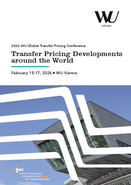2026 WU Global Transfer Pricing Conference: Transfer Pricing Developments around the World

2025 emerged as a momentous year for transfer pricing marked by major developments on the one hand and growing complexity on the other. The OECD’s Working Party 6 resumed its work on revising the guidance on intra-group services in Chapter VII of the OECD TP Guidelines. The UN Tax Committee’s subcommittee on transfer pricing concluded their 2021-2025 workplan having delivered interstitial guidance across six areas. Meanwhile, the OECD’s Pillar One Amount B came into effect on 1 January 2025 with varied reception across jurisdictions. Transfer pricing controversy also intensified with judicial decisions being issued in cases involving notable MNEs. Customs considerations re-emerged in global discourse, while global mobility remained in sharp focus. Business models continue to evolve as MNEs optimise their operational structures, making robust risk control frameworks increasingly critical within the transfer pricing analysis. Certain industries such as pharmaceuticals are also navigating unique challenges requiring tailored solutions. New technologies can now be used to meet compliance requirements, both by taxpayers and by the tax administration.
These developments will be the focus of the 2026 WU Global Transfer Pricing Conference with over 50 worldwide leading transfer pricing experts from academia, international organisations, the business community, government and advisory firms.
Content and structure
Sunday, February 15, 2026
18.00 - 19.30 Welcome Reception
Monday, February 16, 2026
09.00 - 09.15 Welcome Address
09.15 - 10.45 Session 1: Global Transfer Pricing Developments
The year 2025 witnessed considerable challenges in transfer pricing around the world. The OECD continued working on transfer pricing related topics and published the “Consolidated Report on Amount B” as well as the report on “Common errors made by MNE groups in preparing Country-by-Country reports”. Moreover, some noteworthy changes in legislation on country level occurred. Country by Country reporting (CbCR), digital service taxes (DSTs) and the interaction between transfer pricing and customs gained significance in several countries. Additionally, numerous court decisions contributed to further progress in transfer pricing matters. This first session will provide an overview of these and other relevant topics of global developments in the transfer pricing world in 2025.
11.15 - 12.45 Session 2: Transfer Pricing and Recent Case Law
Various court cases contributed to noteworthy trends in transfer pricing once again in the year 2025. Decisions such as United States vs Facebook, India vs Hyatt International, Australia vs Alcoa, Denmark vs Accenture, and Zambia vs Nestlé, as well as other relevant decisions by national courts in various jurisdictions across the globe illustrate these developments. This session aims to emphasize the importance of case law for the future of transfer pricing and to summarize the primary effects of judicial decisions in this field.
14.00 - 15.30 Session 3: Transfer Pricing and Services
Intragroup services are an integral part of the efficient working of an MNE. However, the combined effect of digitalisation and globalisation along with the growing significance of service-related intangible assets, present new challenges for applying the arm’s length principle. With the OECD revisiting its work to update the guidance in Chapter VII of its Transfer Pricing Guidelines and the United Nations’ work focusing on the taxation of cross-border services, this issue has never been more pertinent. This session aims to explore the evolving landscape of transfer pricing and services, looking at the practical and policy implications of recent developments.
16.00 - 17.30 Session 4: Transfer Pricing and Customs
Cross-border transactions affect both customs and transfer pricing legislations, though different rules and approaches are applied. For this reason, the interactions between both areas are particularly considerable. Although this topic has already been addressed by practitioners and academics, it has recently gained significance due to increased interest in customs duties and tariffs. The Court of Justice of the European Union also dealt with this issue in a recent decision. This provides the opportunity for a discussion on the interplay between transfer pricing and customs and recent developments in these areas.
19.00 Heurigen Dinner
Tuesday, February 17, 2026
09.00 - 10.30 Session 5: Transfer Pricing and Global Mobility
Global Mobility is among the main topics which impact tax issues currently. The globalized business environment and cross-border activities lead to altered regulatory frameworks and novel subjects of discussion, which also prompted the OECD to continue working on this issue. This session will explore recent challenges of global mobility and approaches to solutions in the field of transfer pricing.
11.00 - 12.30 Session 6: Transfer Pricing and Risk Control Framework
Risk taking is inherent to MNEs as they pursue opportunities to maximise profits. The 2017 revision of the OECD Transfer Pricing Guidelines stressed out the relevance of the concept of control over risk. Nearly a decade on, how has this concept shaped functional analyses and what challenges continue to arise in its application? This session aims to explore practical considerations on the risk control framework.
13.45 - 15.15 Session 7: Transfer Pricing in the Pharmaceutical Industry
The pharmaceutical industry presents some of the most complex challenges in transfer pricing. The interplay of heavy investment in R&D and the importance of patents and other intangibles raise pressing questions about value creation and profit allocation within MNEs in this industry. The United Nations’ Subcommittee on Transfer Pricing’s recent Interstitial Guidance on the pharmaceutical industry reflects growing international attention to these challenges. This session will explore the distinctive transfer pricing issues facing the industry, how current rules are applied and the possible direction of future reforms.
15.45 - 17.15 Session 8: Transfer Pricing and New Technologies
Rapid technological advancement continues to reshape business processes and decision-making across industries. Tools ranging from advanced real-time analytics to AI-driven automation are enabling faster and more precise approaches to compliance and valuation. This session will examine how these new technologies continue to impact the transfer pricing landscape and how they are able to support both MNEs and governments in achieving more effective transfer pricing outcomes.
17.15 - 17.25 Closing Remarks
Speakers
RAFFAELE PETRUZZI (Italy/Austria)
Managing Director, WU Transfer Pricing Center, WU Vienna
Founder and CEO, PETRUZZI AdvisoryPAULA ACEVEDO FLORES (Chile)
Chief of Staff, Large Taxpayer Division, Servicio de Impuestos Internos (SII)ROCÍO BERMÚDEZ BECERRA (Spain)
Vice-chair, ICC Global Tax Commission, International Chamber of Commerce ICC
Head of Transfer Pricing and Tax Policy, Repsol GroupMAURIZIO BORRIELLO (Italy / Switzerland)
Head of Transfer Pricing, Swiss Competent Authority, State Secretariat for International Finance SIFANDREAS BULLEN (Norway)
Partner, WiersholmMUKESH BUTANI (India)
Managing Partner, BMR LegalBEN CAMPBELL (United Kingdom)
Transfer Pricing (non-financial) Policy Lead, HM Revenue & CustomsMATTEO CENI (Italy)
Head of Global Tax, Chiesi GroupNEVIA ČIČIN-ŠAIN (Croatia/Austria)
Associate Professor of Tax Law, WU ViennaRICHARD COLLIER (United Kingdom)
Associate Fellow, Said Business School, University of OxfordANDREA COSTA CHAVES (Brazil)
Head of Tax Examination Undersecretary, Special Secretary, Federal Revenue of BrazilGIAMMARCO COTTANI (Italy/Netherlands)
Founding Partner, NOEMA GlobalRASMI RANJAN DAS (India/United States)
Senior Economist, Tax Policy Division, IMFSEBASTIAAN DE BUCK (Netherlands)
Head of Tax, UnileverROSANNA D‘ETTORRE (Italy)
MAP and APA Office, Large business and International Directorate, Italian Revenue AgencyMANUEL DE LOS SANTOS (Spain/France)
Head of the Transfer Pricing Unit, OECDGIANNI DE ROBERTIS (Italy)
Chief Economist, Head of KPMG Tax and Legal in Italy, KPMGMARLIES DE RUITER (Netherlands)
International Tax Services Partner, Global International Tax & Transaction Services, EYIAN DYKES (United Kingdom)
Global Transfer Pricing Leader, PwCMAURO FAGGION (Italy/Belgium)
Tax Policy Advisor, DG TAXUD, European CommissionLINDSEY FALKINGHAM (United Kingdom/United States)
Vice President, Global Tax - Transfer Pricing, The Procter & Gamble CompanyEVA FREHNER (Switzerland)
Global Head of Treasury, Group Tax and Real Estate, SulzerGAVIN HALES (Canada)
Associate Director, International Taxation, Department of Finance CanadaKARINE HALIMI-GUEZ (France/Netherlands)
SVP Group Head of Tax, Booking HoldingsBJÖRN HEIDECKE (Germany)
Partner, Transfer Pricing, DeloittePHILIPP KAISER (Germany)
Partner, Tax – Global Transfer Pricing Services, KPMGSEEMA KEJRIWAL JARIWALA (India)
Partner, BMR LegalADRIAN LUCA (Romania)
Founder and Chief Executive Officer, Transfer Pricing Services (TPS)MAYRA LUCAS (Spain/France)
Senior Transfer Pricing Advisor, Centre for Tax Policy and Administration, OECDMERCY MBITHI (Kenya)
International Tax Adviser,Transfer Pricing, African Tax Administration Forum (ATAF)MICHAEL MCDONALD (United States)
Lecturer, University of Virginia School of LawWANDA MONTERO CUELLO (Dominican Republic/France)
Independent ConsultantPRISCA MUSIBI (Kenya/Austria)
Teaching and Research Associate, Institute for Austrian and International Tax Law, WU ViennaINMACULADA MUT AGUILAR (Spain)
Deputy Head, International Tax Office, Spanish Tax AgencyPHILIPPE PAUMIER (France)
Founder, Transfer Pricing Economist, VECTOR TPRAPHAELA RIEGLER (Austria)
Teaching and Research Associate, Institute for Austrian and International Tax Law, WU ViennaROBERT RISSE (Germany/Austria)
Director, WU Tax Law Technology Center, WU ViennaILKA RITTER (Germany/United States)
Tax Policy Advisor, United NationsTHOMAS ROESSER (United States)
GM, Tax Policy Counsel, Microsoft CorporationCHRISTIAN RUNGE (Netherlands)
Global Head of Transfer Pricing and Tax Technology, Shell InternationalALEXANDER RUST (Germany/Austria)
Professor of Tax Law, WU ViennaDANIEL SMITH (United States)
Senior Director, International Tax Planning and Policy, Alphabet/GoogleRICHARD STERN (United States/Austria)
Director, WU Global Tax Law Policy Center, WU ViennaERIK STESSENS (Belgium)
Senior Vice President, Tax, IMK, MastercardWERNER STUFFER (Germany)
Senior Vice President Tax, ZF Friedrichshafen Group, ZF HoldingsRITA SZUDOCZKY (Hungary/Austria)
Associate Professor of Tax Law, WU ViennaRYOSUKE TAKEMURA (Japan/France)
Tax Policy Adviser, Transfer Pricing Unit, OECDISABEL VERLINDEN (Belgium)
Partner, Transfer Pricing and International Tax Policy, NOEMA GlobalINGELA WILLFORS (Sweden)
Director, Tax and Customs Department, Ministry of FinanceCORNELIA WOLFF (Germany)
Partner, International Tax and Transaction Services – Technology and Transformation, EYRAUL ZAMBRANO (Ecuador/Panama)
Technical Assistance and Innovation Director, Inter-American Center of Tax Administrations (CIAT)
Brochure
Registration & practical information
Participation fee
The participation fee for this event is EUR 1,500.-
A 10% “early bird discount” is applicable to applications received by December 9, 2025.
A waiver on the registration fee can be granted to applications from researchers exclusively employed by an academic institution. To apply, please submit a short letter of motivation including the relevance for your research, together with your CV and a list of recent publications to: transferpricingcenter@wu.ac.at.
The participation fee covers all materials, welcome reception, dinner, lunches, coffee breaks and refreshments. Costs of travel and accommodation are not included.
Payment
You will receive an invoice for the participation fee of EUR 1,500.- (or of EUR 1,350.- in case of the “early bird discount”). We kindly ask you to transfer your payment within three weeks from the date of the invoice.
Cancellation
Any notification of cancellation of registration must be sent in writing to transferpricingcenter@wu.ac.at. In case of cancellation before February 2, 2026, the participation fee will be refunded. No refund can be made for cancellations received after this date.
Location
WU Vienna University of Economics and Business
Welthandelsplatz 1
1020 Vienna, Austria
Conference: Building LC, Ceremonial Hall 1
Welcome Reception: Institute for Austrian and International Tax Law, Building D3, 2nd floor
Photos
We would like to inform you that photos and/or videos will be taken at this event. They will be used to provide information about the Institute‘s activities on the website, social media channels and print materials. Should you not wish for your image to be taken, we kindly ask you to avoid the camera and/or inform Ms. Isabel Huber (isabel.huber@wu.ac.at).

